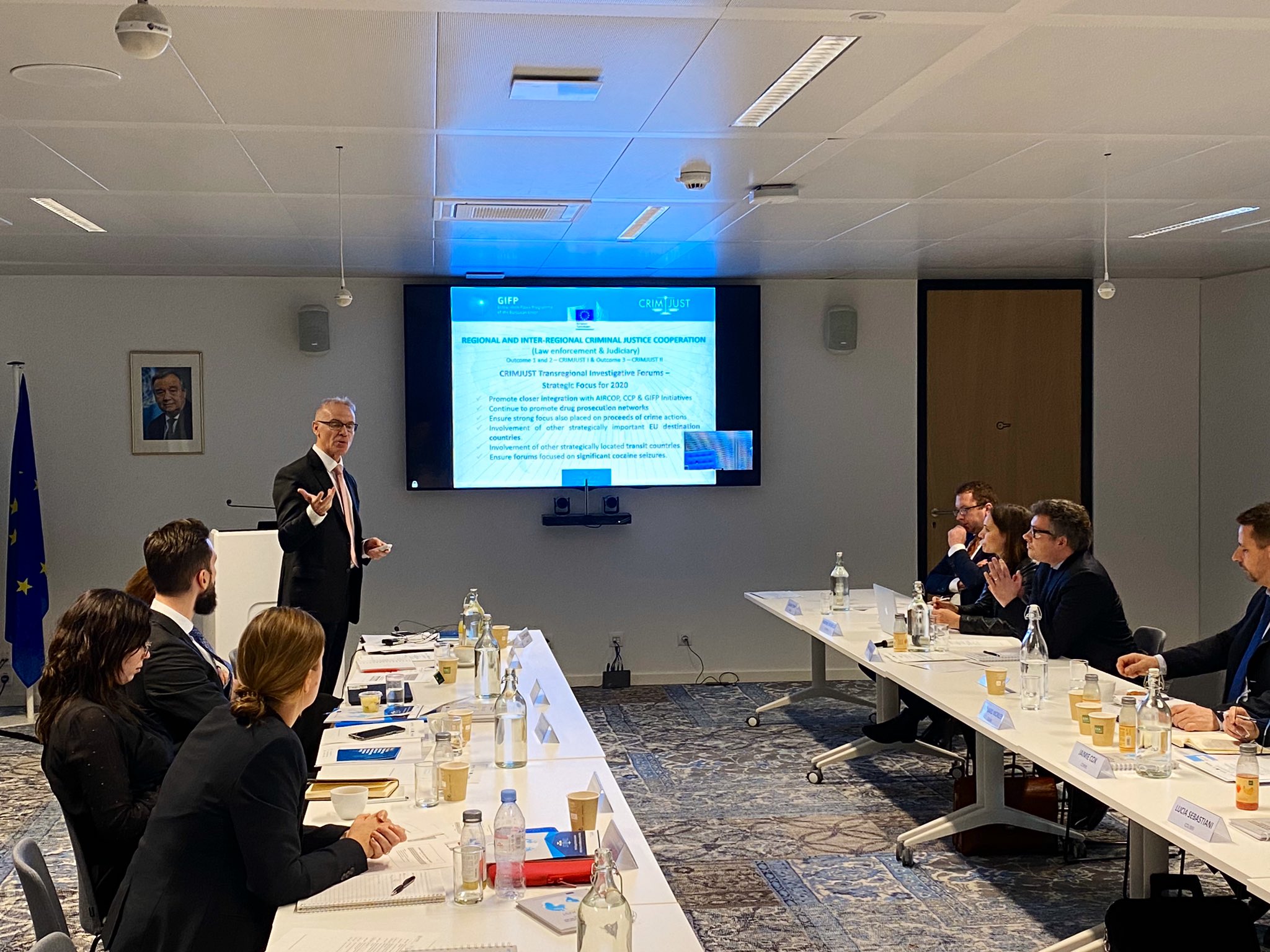
 30 January 2020 - Implementation agencies, partners and donors met at the UN House in Brussels, Belgium, to review CRIMJUST's impact and achievements to date, as well as coordinate its further implementation. Representatives of CRIMJUST's strategic partners, the European Union, UNODC, INTERPOL, Transparency International, COLIBRI, CORMS, the European Judicial Network, and COPOLAD participated in the meeting.
30 January 2020 - Implementation agencies, partners and donors met at the UN House in Brussels, Belgium, to review CRIMJUST's impact and achievements to date, as well as coordinate its further implementation. Representatives of CRIMJUST's strategic partners, the European Union, UNODC, INTERPOL, Transparency International, COLIBRI, CORMS, the European Judicial Network, and COPOLAD participated in the meeting.
The meeting began with welcoming remarks from Andreaa Schimdt, the European Union's Global Illicit Flows Programme Manager, who highlighted CRIMJUST's strong efforts towards achieving the project's objectives and acknowledges the success of its efforts to strengthen transnational criminal justice cooperation between countries affected by the cocaine supply chain in Latin America, the Caribbean, West Africa and Europe. She also stressed the important role of this project in complementing the Global Illicit Flows Program (GIFP), particularly in strengthening criminal justice cooperation beyond interdiction activities.
Yatta Dakowah, Representative and Chief of UNODC Liaison Office Brussels recalled the importance of implementing multilateral strategies given the transnational nature of organized crime. To this end, she thanked partner networks and programs for their participation and collaboration, ensuring that CRIMJUST capitalizes on existing platforms to strengthen trust, networking opportunities and knowledge building.
During the meeting, CRIMJUST presented the status of implementation reviewing the outcomes achieved in 2019. Global Project Coordinator, Glen Prichard, highlighted three CRIMJUST flagship initiatives, including its series of Transregional Investigative Case Forums, its strengthening of cooperative working relationships with prosecutorial networks and finally its technical trainings for institutional reinforcement against cocaine production and trafficking. The actions of Interpol in strengthening the exchange of information between law enforcement agencies was also highlighted. The solid achievements of strengthening institutional integrity through the efforts of UNODC's Corruption and Economic Crime Branch and Transparency International were also presented.
Subsequently, participants discussed the issues arising from implementation and evoked areas for improvement, detailing necessary future actions to ensure that CRIMJUST continues to work towards promoting transregional criminal justice cooperation beyond seizures. Partner programs and organizations offered inputs and feedback, ensuring that priorities and objectives are strategically aligned.
The CRIMJUST team also presented the priorities for 2020, which will continue to focus on promoting post seizure investigation actions transregionally along drug trafficking routes, through the facilitation of additional transregional investigative forums between source, transit and destination countries along drug trafficking routes. CRIMJUST will continue to strengthen institutional integrity among these countries and strengthen prosecution networks working along trafficking routes.
Finally, participants assessed potential risks and challenges arising from implementation. Mainly, the importance of maintaining two-way communication at all times was stressed, as was providing informal channels to build trust and enable intelligence sharing despite the overlap of various political and legal systems and languages.
A number of recommendations were made as a result of this Project Steering Committee, with partners committing to enhancing CRIMJUST "post-seizure seizure" approach. The PSCC is a pivotal event during the CRIMJUST year ensuring its action remains aligned and coherent with the objectives of the Global Illicit Flows Programme (GIFP).
CRIMJUST is funded by the European Union under the framework of the "Global Illicit Flows Programme (GIFP)" and by the US Bureau of International Narcotics and Law Enforcement Affairs (INL). It seeks to enhance law enforcement and judicial counter-narcotic strategies beyond interdiction activities and to foster transnational responses targeting each stage of the drug supply chain.
For more information, please visit:
- Bureau of International Narcotics and Law Enforcement Affairs (INL)
- European Union "Cocaine Route Programme"
